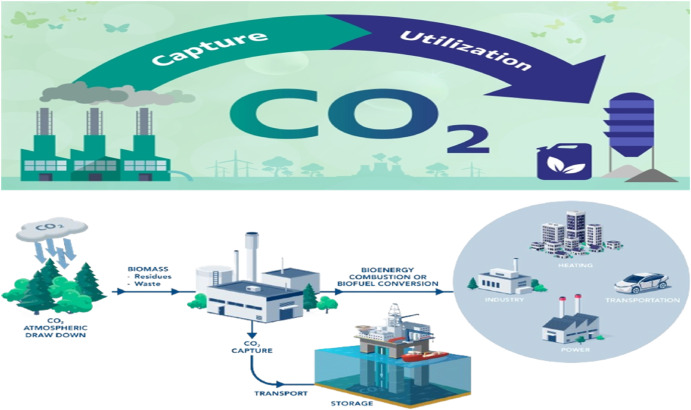Transforming CO₂ Emissions into Sustainable Profit

Strong 8k brings an ultra-HD IPTV experience to your living room and your pocket.
Could CO₂, the very gas wreaking havoc on our planet, become a source of sustainable profit? If you're an environmental entrepreneur or an investor in green technology, the answer might surprise you. We're now at the forefront of a sustainability revolution, where transforming carbon dioxide emissions into valuable products and services could redefine global business models.
This blog explores how CO₂ is no longer seen as merely a pollutant but a raw material for innovation. From the science behind CO₂ conversion to investment-worthy businesses and the supportive role of government policies, we’ll examine how CO₂ transformation is paving the way to a profit-driven, sustainable future.
The Science of CO₂ Conversion
At its core, CO₂ conversion is the process of capturing and transforming carbon dioxide emissions into usable, often valuable, materials. Several cutting-edge technologies are making this possible, with applications that span across industries.
CO₂ Capture Technology
CO₂ capture systems are the initial step, with advanced CO₂ plant and recovery solutions taking the lead. Companies like MOS Techno Engineers are working on high-efficiency systems that capture carbon emissions directly from industrial sources. These systems can provide high-purity CO₂ systems for various end uses, including chemical manufacturing and food-grade applications.
Turning CO₂ Into Usable Products
What happens after CO₂ is captured? Using innovative technologies, CO₂ can be transformed into products such as:
Synthetic fuels created through processes like Fischer-Tropsch synthesis.
Building materials like concrete where CO₂ can be mineralized and stored permanently.
Carbonated beverages, where CO₂ is injected to create fizz.
Polymers and plastics, key materials in industries from textiles to automotive.
The Role of Green Chemistry
Green chemistry innovations are taking CO₂ conversion a step further by integrating it into sustainable processes. For example, CO₂ for chemical manufacturing serves as a sustainable replacement for traditional raw materials, reducing the environmental footprint of chemical production.
Successful Business Models Transforming CO₂
Some forward-thinking companies have already turned CO₂ into profit. Their business models highlight how this transformation is more than theoretical.
Climeworks (Switzerland): One of the leaders in direct air capture technology, Climeworks captures CO₂ directly from the atmosphere and sells it to industries like beverage carbonation CO₂. Their captured CO₂ is even used to create renewable fuels.
MOS Techno Engineers (India): Specializing in CO₂ recovery and production solutions, MOS Techno Engineers provides advanced systems for industries such as beverage carbonation, oil recovery, and refrigeration, helping businesses reduce carbon emissions and promote sustainability.
CarbonCure (Canada): This company injects CO₂ into concrete during the manufacturing process, not only sequestering the CO₂ but also enhancing the product’s strength.
LanzaTech (United States): A biotech firm using microbes to ferment captured CO₂ and convert it into ethanol, which is then used for fuel or chemicals.
Investment Opportunities in CO₂ Transformation
If you’re an investor eager to back sustainable innovation, this is an opportunity too significant to ignore. Market estimates project that CO₂ transformation technologies could generate billions in revenue annually as industries transition to carbon-neutral operations.
Where Investors Should Focus
CO₂ Capture and Supply Chain Solutions
Invest in high-efficiency CO₂ recovery plants and supply chain solutions that provide the equipment and logistics to transport captured CO₂ to industries that can use it.
Early-Stage Technologies
Look to startups focused on CO₂-to-chemical and biofuel production. These companies often operate at the cutting edge of science, offering high-risk but high-reward investment opportunities.
Energy-Intensive Industries
Industries like steel production, cement manufacturing, and energy are slowly integrating CO₂ conversion technologies into their processes. Investing in these industries' transition efforts could yield substantial gains.
Challenges and Solutions
Despite its promise, scaling CO₂ transformation is not without challenges. High costs, scalability issues, and infrastructure requirements are critical barriers.
Overcoming Cost Challenges
Research and development (R&D) remain vital to make CO₂ technologies more cost-competitive. Public-private partnerships can further reduce the financial burden on individual companies.
Scaling Infrastructure
Most CO₂ projects require significant infrastructure investments. Governments must step up with grants and subsidies to develop CO₂ pipelines and storage facilities.
Integration with Existing Systems
A significant hurdle is retrofitting carbon capture technologies into existing industrial systems. However, companies like MOS Techno Engineers specialize in designing modular units that make such integration easier and more affordable.
Policy and Incentives for Sustainable CO₂ Solutions
Governments worldwide are creating policies that support CO₂ transformation. From carbon pricing initiatives to tax incentives for CO₂ capture technologies, these measures are making sustainable business models more viable.
For example, the U.S. 45Q tax credit guarantees financial benefits for companies that capture CO₂ and store it permanently or reuse it sustainably. Similarly, the European Union’s Green Deal allocates billions toward decarbonizing industries, spurring innovation in this space.
The Future of CO₂ Transformation
What’s next for CO₂ transformation? The future looks promising as several trends point toward mainstream adoption.
Autonomous CO₂ Systems
Advancements in AI could optimize CO₂ capture systems, reducing energy consumption and costs. Imagine autonomous plants detecting and adjusting to fluctuations in CO₂ emissions.
Expanding Applications
Beyond synthetic fuels and building materials, researchers are exploring applications like creating food-grade proteins from CO₂. This could have a revolutionary impact on global food supply chains.
Global Collaboration
International initiatives, like the UN’s Mission Innovation, are fostering collaborative efforts to scale CO₂ technologies worldwide. Such teamwork will likely accelerate breakthroughs and lower costs.
Be Part of the CO₂ Revolution
The transformation of CO₂ emissions into sustainable profit is not just a pipe dream; it’s an actionable reality unfolding today. For environmental entrepreneurs, this represents an opportunity to develop earth-conscious businesses. For green tech investors, it’s a chance to capitalize on products that satisfy both planet and profit.
Whether you’re ready to innovate, invest, or advocate, now is the time to act. CO₂ might just become the most valuable resource in the fight against climate change.
Join the dialogue, explore partnerships, or learn more about integrating CO₂ solutions into your business. Reach out to us today, and start building a sustainable future.
Note: IndiBlogHub features both user-submitted and editorial content. We do not verify third-party contributions. Read our Disclaimer and Privacy Policyfor details.


